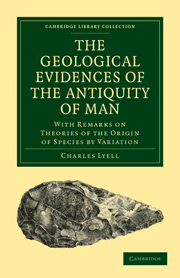 The Geological Evidences of the Antiquity of Man
The Geological Evidences of the Antiquity of Man Book contents
- Frontmatter
- Contents
- CHAPTER I INTRODUCTION
- CHAPTER II RECENT PERIOD—DANISH PEAT AND SHELL MOUNDS—SWISS LAKE DWELLINGS
- CHAPTER III FOSSIL HUMAN REMAINS AND WORKS OF ART OF THE RECENT PERIOD
- CHAPTER IV POST-PLIOCENE PERIOD: BONES OF MAN AND EXTINCT MAMMALIA IN BELGIAN CAVERNS
- CHAPTER V POST-PLIOCENE PERIOD: FOSSIL HUMAN SKULLS OF THE NEANDERTHAL AND ENGIS CAVES
- CHAPTER VI POST-PLIOCENE ALLUVIUM AND CAVE DEPOSITS WITH FLINT IMPLEMENTS
- CHAPTER VII PEAT AND POST-PLIOCENE ALLUVIUM OF THE VALLEY OF THE SOMME
- CHAPTER VIII POST-PLIOCENE ALLUVIUM WITH FLINT IMPLEMENTS OF THE VALLEY OF THE SOMME—concluded
- CHAPTER IX WORKS OF ART IN POST-PLIOCENE ALLUVIUM OF FRANCE AND ENGLAND
- CHAPTER X CAVERN DEPOSITS, AND PLACE OF SEPULTURE OF THE POST-PLIOCENE PERIOD
- CHAPTER XI AGE OF HUMAN FOSSILS OF LE PUY IN CENTRAL FRANCE AND OF NATCHEZ ON THE MISSISSIPPI, DISCUSSED
- CHAPTER XII ANTIQUITY OF MAN RELATIVELY TO THE GLACIAL PERIOD AND TO THE EXISTING FAUNA AND FLORA
- CHAPTER XIII CHRONOLOGICAL RELATIONS OF THE GLACIAL PERIOD AND THE EARLIEST SIGNS OF MAN'S APPEARANCE IN EUROPE
- CHAPTER XIV CHRONOLOGICAL RELATIONS OF THE GLACIAL PERIOD AND THE EARLIEST SIGNS OF MAN'S APPEARANCE IN EUROPE—continued
- CHAPTER XV EXTINCT GLACIERS OF THE ALPS AND THEIR CHRONOLOGICAL RELATION TO THE HUMAN PERIOD
- CHAPTER XVI HUMAN REMAINS IN THE LOESS, AND THEIR PROBABLE AGE
- CHAPTER XVII POST-GLACIAL DISLOCATIONS AND FOLDINGS OF CRETACEOUS AND DRIFT STRATA IN THE ISLAND OF MÖEN, IN DENMARK
- CHAPTER XVIII THE GLACIAL PERIOD IN NORTH AMERICA
- CHAPTER XIX RECAPITULATION OF GEOLOGICAL PROOFS OF MAN'S ANTIQUITY
- CHAPTER XX THEORIES OF PROGRESSION AND TRANSMUTATION
- CHAPTER XXI ON THE ORIGIN OF SPECIES BY VARIATION AND NATURAL SELECTION
- CHAPTER XXII OBJECTIONS TO THE HYPOTHESIS OF TRANSMUTATION CONSIDERED
- CHAPTER XXIII ORIGIN AND DEVELOPMENT OF LANGUAGES AND SPECIES COMPARED
- CHAPTER XXIV BEARING OF THE DOCTRINE OF TRANSMUTATION ON THE ORIGIN OF MAN, AND HIS PLACE IN THE CREATION
- INDEX
CHAPTER XX - THEORIES OF PROGRESSION AND TRANSMUTATION
Published online by Cambridge University Press: 29 August 2010
- Frontmatter
- Contents
- CHAPTER I INTRODUCTION
- CHAPTER II RECENT PERIOD—DANISH PEAT AND SHELL MOUNDS—SWISS LAKE DWELLINGS
- CHAPTER III FOSSIL HUMAN REMAINS AND WORKS OF ART OF THE RECENT PERIOD
- CHAPTER IV POST-PLIOCENE PERIOD: BONES OF MAN AND EXTINCT MAMMALIA IN BELGIAN CAVERNS
- CHAPTER V POST-PLIOCENE PERIOD: FOSSIL HUMAN SKULLS OF THE NEANDERTHAL AND ENGIS CAVES
- CHAPTER VI POST-PLIOCENE ALLUVIUM AND CAVE DEPOSITS WITH FLINT IMPLEMENTS
- CHAPTER VII PEAT AND POST-PLIOCENE ALLUVIUM OF THE VALLEY OF THE SOMME
- CHAPTER VIII POST-PLIOCENE ALLUVIUM WITH FLINT IMPLEMENTS OF THE VALLEY OF THE SOMME—concluded
- CHAPTER IX WORKS OF ART IN POST-PLIOCENE ALLUVIUM OF FRANCE AND ENGLAND
- CHAPTER X CAVERN DEPOSITS, AND PLACE OF SEPULTURE OF THE POST-PLIOCENE PERIOD
- CHAPTER XI AGE OF HUMAN FOSSILS OF LE PUY IN CENTRAL FRANCE AND OF NATCHEZ ON THE MISSISSIPPI, DISCUSSED
- CHAPTER XII ANTIQUITY OF MAN RELATIVELY TO THE GLACIAL PERIOD AND TO THE EXISTING FAUNA AND FLORA
- CHAPTER XIII CHRONOLOGICAL RELATIONS OF THE GLACIAL PERIOD AND THE EARLIEST SIGNS OF MAN'S APPEARANCE IN EUROPE
- CHAPTER XIV CHRONOLOGICAL RELATIONS OF THE GLACIAL PERIOD AND THE EARLIEST SIGNS OF MAN'S APPEARANCE IN EUROPE—continued
- CHAPTER XV EXTINCT GLACIERS OF THE ALPS AND THEIR CHRONOLOGICAL RELATION TO THE HUMAN PERIOD
- CHAPTER XVI HUMAN REMAINS IN THE LOESS, AND THEIR PROBABLE AGE
- CHAPTER XVII POST-GLACIAL DISLOCATIONS AND FOLDINGS OF CRETACEOUS AND DRIFT STRATA IN THE ISLAND OF MÖEN, IN DENMARK
- CHAPTER XVIII THE GLACIAL PERIOD IN NORTH AMERICA
- CHAPTER XIX RECAPITULATION OF GEOLOGICAL PROOFS OF MAN'S ANTIQUITY
- CHAPTER XX THEORIES OF PROGRESSION AND TRANSMUTATION
- CHAPTER XXI ON THE ORIGIN OF SPECIES BY VARIATION AND NATURAL SELECTION
- CHAPTER XXII OBJECTIONS TO THE HYPOTHESIS OF TRANSMUTATION CONSIDERED
- CHAPTER XXIII ORIGIN AND DEVELOPMENT OF LANGUAGES AND SPECIES COMPARED
- CHAPTER XXIV BEARING OF THE DOCTRINE OF TRANSMUTATION ON THE ORIGIN OF MAN, AND HIS PLACE IN THE CREATION
- INDEX
Summary
WHEN speaking in a former work of the distinct races of mankind, I remarked that, ‘if all the leading varieties of the human family sprang originally from a single pair,’ (a doctrine, to which then, as now, I could see no valid objection,) ‘a much greater lapse of time was required for the slow and gradual formation of such races as the Caucasian, Mongolian, and Negro, than was embraced in any of the popular systems of chronology.’
In confirmation of the high antiquity of two of these, I referred to pictures on the walls of ancient temples in Egypt, in which, a thousand years or more before the Christian era, ‘the Negro and Caucasian physiognomies were portrayed as faithfully, and in as strong contrast, as if the likenesses of these races had been taken yesterday.’ In relation to the same subject, I dwelt on the slight modification which the Negro has undergone, after having been transported from the tropics, and settled for more than two centuries in the temperate climate of Virginia. I therefore concluded that, ‘if the various races were all descended from a single pair, we must allow for a vast series of antecedent ages, in the course of which the long-continued influence of external circumstances gave rise to peculiarities increased in many successive generations, and at length fixed by hereditary transmission.’
- Type
- Chapter
- Information
- The Geological Evidences of the Antiquity of ManWith Remarks on Theories of the Origin of Species by Variation, pp. 385 - 406Publisher: Cambridge University PressPrint publication year: 2009First published in: 1863


